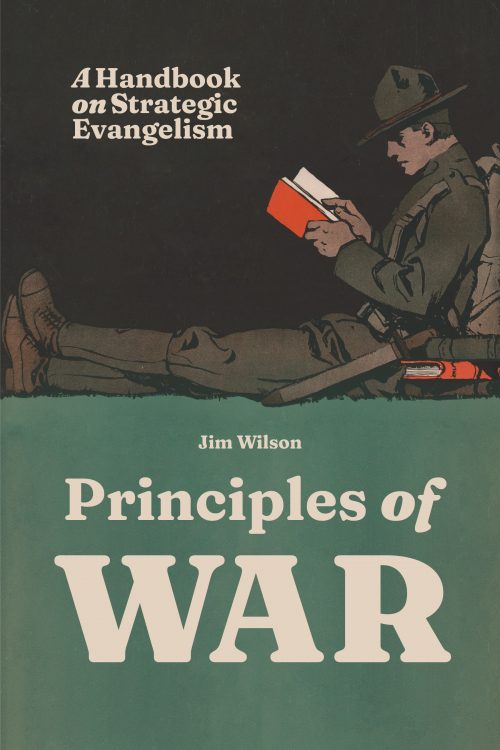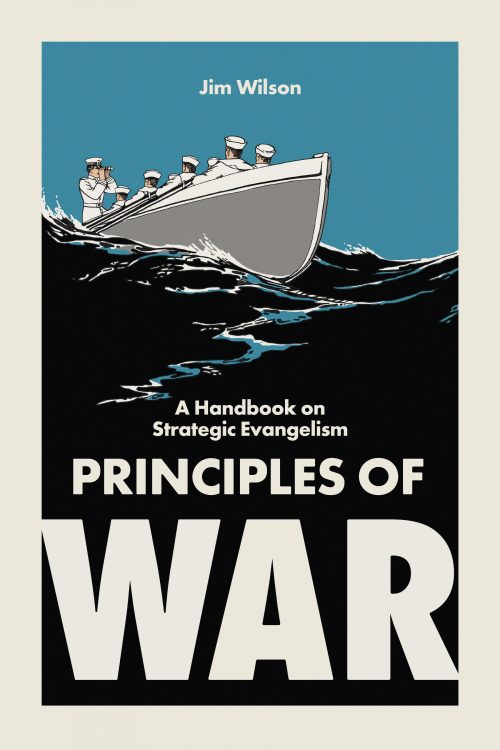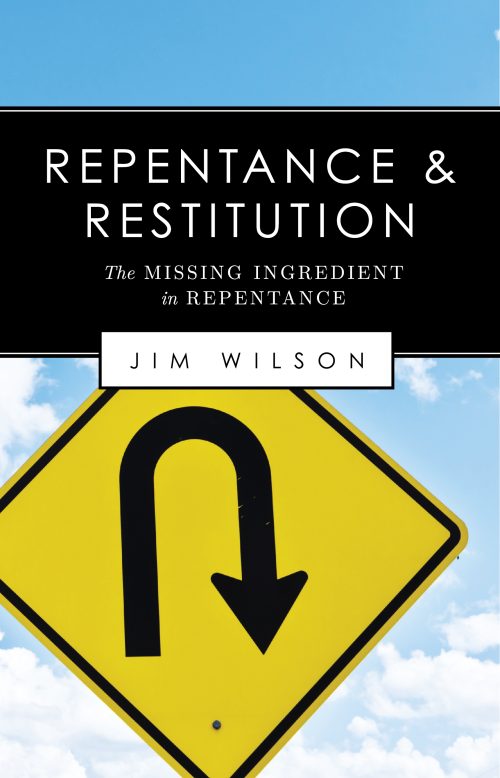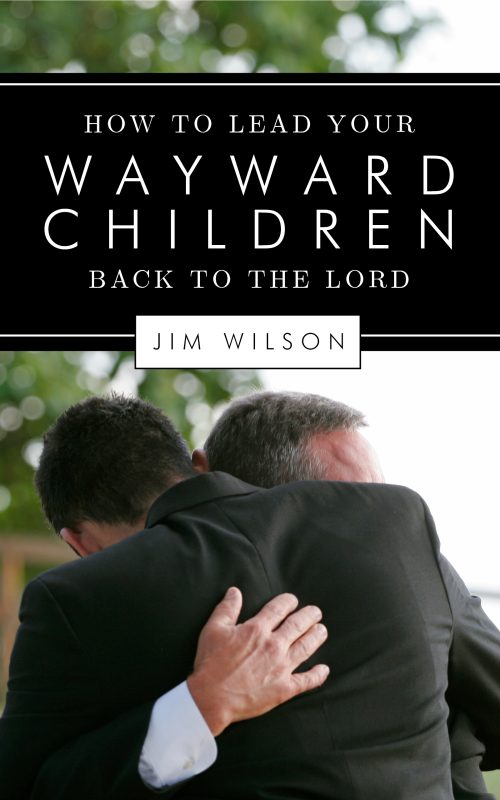-

 In the study of warfare, great men have concluded that there are some overriding principles which, if followed, will always tend toward success in battle, and if neglected or ignored, will tend toward defeat or even destruction. These principles have been entitled the "principles of war." But not all warfare is waged on a battlefield: every Christian is called to be a soldier. Our fight is against Satan, our objective is the acknowledgment and fulfillment of God's commands, and our ammunition is the power of the Holy Spirit. In Principles of War, Jim Wilson outlines the time-tried, fundamental principles of war and explains how we can employ them in our daily spiritual battles as we fight a war which our commander in chief has already won for us.
In the study of warfare, great men have concluded that there are some overriding principles which, if followed, will always tend toward success in battle, and if neglected or ignored, will tend toward defeat or even destruction. These principles have been entitled the "principles of war." But not all warfare is waged on a battlefield: every Christian is called to be a soldier. Our fight is against Satan, our objective is the acknowledgment and fulfillment of God's commands, and our ammunition is the power of the Holy Spirit. In Principles of War, Jim Wilson outlines the time-tried, fundamental principles of war and explains how we can employ them in our daily spiritual battles as we fight a war which our commander in chief has already won for us. -
 Jesus’ death paid for our sins - the guilt, the death, and the punishment. Jesus does not repay the man who got ripped off when we stole from him. According to the Bible, the person who comes to the Lord in repentance is to pay the one he stole from the value of the stolen goods plus one fifth of the value. But what if it is a candy bar you took twenty years ago? The amount stolen and the time since the theft do not make it yours. There are many Christians who are living subnormal Christian lives because they are too proud or too afraid to make restitution. They are like people with low-grade fevers; they are not sick enough to be in bed, but too sick to do anything worthwhile. Even if no one knows about the thefts, these Christians are poor witnesses for Jesus Christ. They may have confessed and repented in words, but if they do not make restitution, it is not true repentance, and they are not forgiven.
Jesus’ death paid for our sins - the guilt, the death, and the punishment. Jesus does not repay the man who got ripped off when we stole from him. According to the Bible, the person who comes to the Lord in repentance is to pay the one he stole from the value of the stolen goods plus one fifth of the value. But what if it is a candy bar you took twenty years ago? The amount stolen and the time since the theft do not make it yours. There are many Christians who are living subnormal Christian lives because they are too proud or too afraid to make restitution. They are like people with low-grade fevers; they are not sick enough to be in bed, but too sick to do anything worthwhile. Even if no one knows about the thefts, these Christians are poor witnesses for Jesus Christ. They may have confessed and repented in words, but if they do not make restitution, it is not true repentance, and they are not forgiven. -
 “Oh, the depth of the riches and wisdom and knowledge of God!” (Rom. 11:33). Our heavenly Father has given us unfathomable blessings, but we often fail to live as if they are truly ours. In thankfulness and Confession, Brad Scheelke encourages readers to meditate on and rejoice in the glorious riches of our inheritance in Christ. As we regularly give thanks for what God has given us, our thoughts and actions will begin to change . . . often in surprising ways. Gratitude also changes how we deal with sin. When we confess our sin, bringing it into the light of Christ’s riches, we now see not only the darkness of our own evil, but also the beauty of God’s holiness and grace. When we learn to practice thankfulness and confession in this way, our hearts will overflow in joy, in love for one another, and in glory to God.
“Oh, the depth of the riches and wisdom and knowledge of God!” (Rom. 11:33). Our heavenly Father has given us unfathomable blessings, but we often fail to live as if they are truly ours. In thankfulness and Confession, Brad Scheelke encourages readers to meditate on and rejoice in the glorious riches of our inheritance in Christ. As we regularly give thanks for what God has given us, our thoughts and actions will begin to change . . . often in surprising ways. Gratitude also changes how we deal with sin. When we confess our sin, bringing it into the light of Christ’s riches, we now see not only the darkness of our own evil, but also the beauty of God’s holiness and grace. When we learn to practice thankfulness and confession in this way, our hearts will overflow in joy, in love for one another, and in glory to God. -
 We love our kids, but do we love like God loves....without conditions, reservations, or reluctance? In this excerpt from his popular book How to be Free from Bitterness, Jim Wilson identifies the troublesome consequences of insufficient parental love and points readers to the glorious fruit of superabundant kindness, and patience and helps parents apply the eternal truths of Scripture to grow peace and joy in their homes.
We love our kids, but do we love like God loves....without conditions, reservations, or reluctance? In this excerpt from his popular book How to be Free from Bitterness, Jim Wilson identifies the troublesome consequences of insufficient parental love and points readers to the glorious fruit of superabundant kindness, and patience and helps parents apply the eternal truths of Scripture to grow peace and joy in their homes.
-
 “Revolutionary love” sounds like an oxymoron. Revolution is usually a negative, violent, and destructive change, while love is positive, peaceful, and contented. But true love always changes people. And Christ’s love brings the most revolutionary change of all. Festo Kivengere (1919–88) experienced both kinds of revolution. He escaped Uganda when the brutal regime of Idi Amin seized power. But he could not escape the pursuit of Jesus, who came into his life with radically transformative grace. In Revolutionary Love, Kivengere tells his story of learning to freely receive Christ’s love and freely share it with others. Have an Audible subscription? You can also get this title on Audible here.
“Revolutionary love” sounds like an oxymoron. Revolution is usually a negative, violent, and destructive change, while love is positive, peaceful, and contented. But true love always changes people. And Christ’s love brings the most revolutionary change of all. Festo Kivengere (1919–88) experienced both kinds of revolution. He escaped Uganda when the brutal regime of Idi Amin seized power. But he could not escape the pursuit of Jesus, who came into his life with radically transformative grace. In Revolutionary Love, Kivengere tells his story of learning to freely receive Christ’s love and freely share it with others. Have an Audible subscription? You can also get this title on Audible here. -
 Bitterness often grows out of a small offense - perhaps a passing word, an accidental shove, or a pair of dirty socks left in the middle of the living room floor. Yet when bitterness takes root in our hearts, its effects are anything but small. In this collection of short articles, Jim Wilson and others discuss what it means to live as "imitators of God." As the Apostle Paul says in Ephesians, we have been called to leave the bitterness and anger of the world and instead embrace the love and compassion of our God. The authors remind us that we are to forgive others just as we have been forgiven, pointing to Scriptural admonitions and examples as they offer sound teaching on the trials and temptations of everyday life. Have an Audible account? Get this title on Audible here. Did you know we give away more copies of How to Be Free from Bitterness than we sell? These copies are paid for entirely by donations. Have you been blessed by this booklet? You can help fund copies for someone else by making a tax-deductible gift to the literature fund here.
Bitterness often grows out of a small offense - perhaps a passing word, an accidental shove, or a pair of dirty socks left in the middle of the living room floor. Yet when bitterness takes root in our hearts, its effects are anything but small. In this collection of short articles, Jim Wilson and others discuss what it means to live as "imitators of God." As the Apostle Paul says in Ephesians, we have been called to leave the bitterness and anger of the world and instead embrace the love and compassion of our God. The authors remind us that we are to forgive others just as we have been forgiven, pointing to Scriptural admonitions and examples as they offer sound teaching on the trials and temptations of everyday life. Have an Audible account? Get this title on Audible here. Did you know we give away more copies of How to Be Free from Bitterness than we sell? These copies are paid for entirely by donations. Have you been blessed by this booklet? You can help fund copies for someone else by making a tax-deductible gift to the literature fund here. -

Men were designed, created, and commanded to bear responsibility, but our history of failure in this area stretches all the way back to Adam. Today irresponsibility is considered normal, even a birthright. Jim Wilson outlines the causes and results of this failure, the biblical principles and characteristics that define a responsible man, and how men can apply them both in their own lives and in raising their sons.
Masculinity does not have to be proved with muscularity, sexual prowess, or bragging. True masculinity is established by taking up the responsibility God has given you.
-
 Disobedience. It’s normal, right? For hundreds of years, the Church has struggled with how to overcome sin in the Christian life. We know that the cross takes care of our past sins at salvation and assures us life after death. But what do we do with the time in between? Many Christians go through life sinning and confessing, sinning and confessing, but they never get beyond that. Is that better than sinning and not confessing? Absolutely: but it is not enough if you want to grow. Contrary to most evangelical teaching today, Christian obedience is meant to be glad-hearted, willing, and normal. In Dead and Alive, Jim Wilson discusses the neglected requirement of obedience and explains God’s provision for it from Scripture. May the thoughts in it lead you into a victorious, obedient life in Christ. "But just as he who called you is holy, so be holy in all you do; for it is written: 'Be holy, because I am holy.'” (1 Pet. 1:15–16) Have an Audible subscription? This title is also available on Audible here.
Disobedience. It’s normal, right? For hundreds of years, the Church has struggled with how to overcome sin in the Christian life. We know that the cross takes care of our past sins at salvation and assures us life after death. But what do we do with the time in between? Many Christians go through life sinning and confessing, sinning and confessing, but they never get beyond that. Is that better than sinning and not confessing? Absolutely: but it is not enough if you want to grow. Contrary to most evangelical teaching today, Christian obedience is meant to be glad-hearted, willing, and normal. In Dead and Alive, Jim Wilson discusses the neglected requirement of obedience and explains God’s provision for it from Scripture. May the thoughts in it lead you into a victorious, obedient life in Christ. "But just as he who called you is holy, so be holy in all you do; for it is written: 'Be holy, because I am holy.'” (1 Pet. 1:15–16) Have an Audible subscription? This title is also available on Audible here. -
 Insist that Christ is Lord, and you divide the world. While most societies acknowledge God in some way or another, Christ as Lord is not so universally honored. For Christians, this matter should be settled. Christ is Lord and Savior — but many Christians have little or no idea of the meaning of this simple statement or its implications for our day-to-day lives. Sixty years after its first publication, the message of The Lordship of Jesus Christ is still needed. “In words of gentle, yet pointed, rebuke, Christ turned to His disciples with the very pertinent question, ‘Why call ye me, Lord, Lord, and do not the things which I say?’ (Luke 6:46). Holiness is not correct Christian phraseology, but an unreserved commitment to unquestioning obedience to whatever the Lord requires.” – Bill Pape, The Lordship of Jesus Christ Have an Audible subscription? This title is also available on Audible here.
Insist that Christ is Lord, and you divide the world. While most societies acknowledge God in some way or another, Christ as Lord is not so universally honored. For Christians, this matter should be settled. Christ is Lord and Savior — but many Christians have little or no idea of the meaning of this simple statement or its implications for our day-to-day lives. Sixty years after its first publication, the message of The Lordship of Jesus Christ is still needed. “In words of gentle, yet pointed, rebuke, Christ turned to His disciples with the very pertinent question, ‘Why call ye me, Lord, Lord, and do not the things which I say?’ (Luke 6:46). Holiness is not correct Christian phraseology, but an unreserved commitment to unquestioning obedience to whatever the Lord requires.” – Bill Pape, The Lordship of Jesus Christ Have an Audible subscription? This title is also available on Audible here. -
 You love God. You love your kids. So why don’t they love Him? God promises lovingkindness to a thousand generations for families who love and obey Him (Deut. 7:9). Why are children who grew up in Christian homes leaving the faith, and how do we get them to come back? No matter how old your children are, there is a solution. With decades of pastoral wisdom, Jim Wilson identifies the common causes of rebellion and helps parents apply the eternal truths of Scripture to “turn the hearts of the parents to their children and the disobedient to the wisdom of the righteous—to make ready a people prepared for the Lord” (Luke 1:17).
You love God. You love your kids. So why don’t they love Him? God promises lovingkindness to a thousand generations for families who love and obey Him (Deut. 7:9). Why are children who grew up in Christian homes leaving the faith, and how do we get them to come back? No matter how old your children are, there is a solution. With decades of pastoral wisdom, Jim Wilson identifies the common causes of rebellion and helps parents apply the eternal truths of Scripture to “turn the hearts of the parents to their children and the disobedient to the wisdom of the righteous—to make ready a people prepared for the Lord” (Luke 1:17).
-
 In a world of dysfunctional families, churches, and societies, professional counseling is in great demand as a solution to our problems. The weak link in this solution is the inability to determine a counselor’s qualifications apart from his professional accreditation. Academics can give you knowledge, but no learning or books can give you wisdom. There are no graduate degrees in love or compassion. You cannot get a PhD in virtue. However, these things are available to everyone freely through Christ. Counseling needs knowledge, but it needs wisdom even more. Wisdom comes from the Bible, from age and experience, from answered prayer. “If any of you lacks wisdom, you should ask God, who gives generously to all without finding fault, and it will be given to you” (James 1:5). As Christians, our objective is to bring others up to maturity in Christ. To do this, we must have the same qualifications Paul had (the wisdom, the holiness, and the love). This book is for counselors and all Christians as they work “to present everyone perfect in Christ” (Col. 1:28). In Wisdom, Not Knowledge, Jim Wilson shares what he has learned from the Bible, personal experience, and answered prayer in more than six decades of counseling. With chapters on comforting, exhorting, rebuking, forgiving, and prayer as well as treatments of special subjects such as depression, false guilt, and self-esteem, this book is a great resource for any counselor, whether you're a professional or just trying to help a friend. Not a counselor? Learn how to grow in Christ and discover solutions to your own problems as you apply the wisdom in these chapters to your life.
In a world of dysfunctional families, churches, and societies, professional counseling is in great demand as a solution to our problems. The weak link in this solution is the inability to determine a counselor’s qualifications apart from his professional accreditation. Academics can give you knowledge, but no learning or books can give you wisdom. There are no graduate degrees in love or compassion. You cannot get a PhD in virtue. However, these things are available to everyone freely through Christ. Counseling needs knowledge, but it needs wisdom even more. Wisdom comes from the Bible, from age and experience, from answered prayer. “If any of you lacks wisdom, you should ask God, who gives generously to all without finding fault, and it will be given to you” (James 1:5). As Christians, our objective is to bring others up to maturity in Christ. To do this, we must have the same qualifications Paul had (the wisdom, the holiness, and the love). This book is for counselors and all Christians as they work “to present everyone perfect in Christ” (Col. 1:28). In Wisdom, Not Knowledge, Jim Wilson shares what he has learned from the Bible, personal experience, and answered prayer in more than six decades of counseling. With chapters on comforting, exhorting, rebuking, forgiving, and prayer as well as treatments of special subjects such as depression, false guilt, and self-esteem, this book is a great resource for any counselor, whether you're a professional or just trying to help a friend. Not a counselor? Learn how to grow in Christ and discover solutions to your own problems as you apply the wisdom in these chapters to your life. -
 “The unity of the Body is one of the most forceful apologetics for the divinity of Christ. Conversely, disunity is Satan’s most successful tool.” – Otto Helweg
“The unity of the Body is one of the most forceful apologetics for the divinity of Christ. Conversely, disunity is Satan’s most successful tool.” – Otto HelwegGod’s glory in us is the basic provision for Christian unity. “I have given them the glory that you gave me, that they may be one as we are one: I in them and you in me. May they be brought to complete unity to let the world know that you sent me and have loved them even as you have loved me” (John 17:20-23).
The primary assumption in this book is the authority and inspiration of the Scriptures. There are promises, prayers, and commands in the New Testament concerning the church’s unity in Christ. The Christian church is made up of individual members of the body of Christ. This book is written to those individuals. The church as a whole cannot obey God. Only the parts can.
Have an Audible subscription? This title is also available on Audible here.
